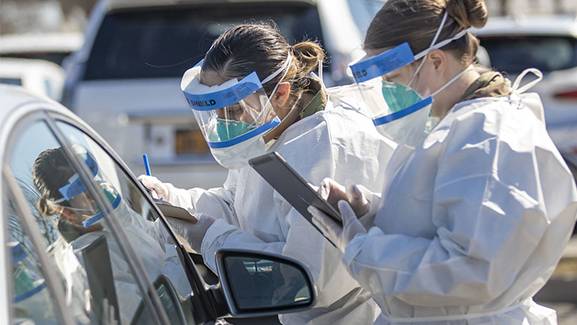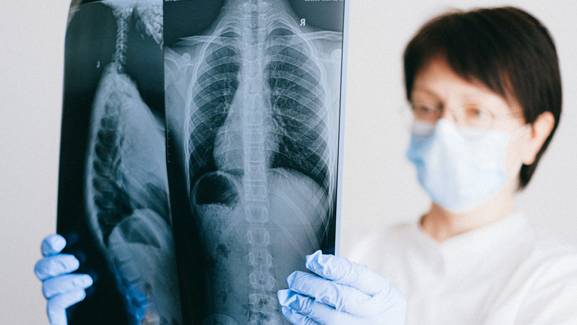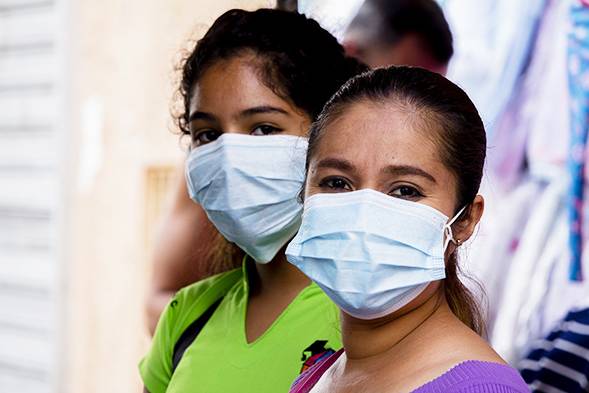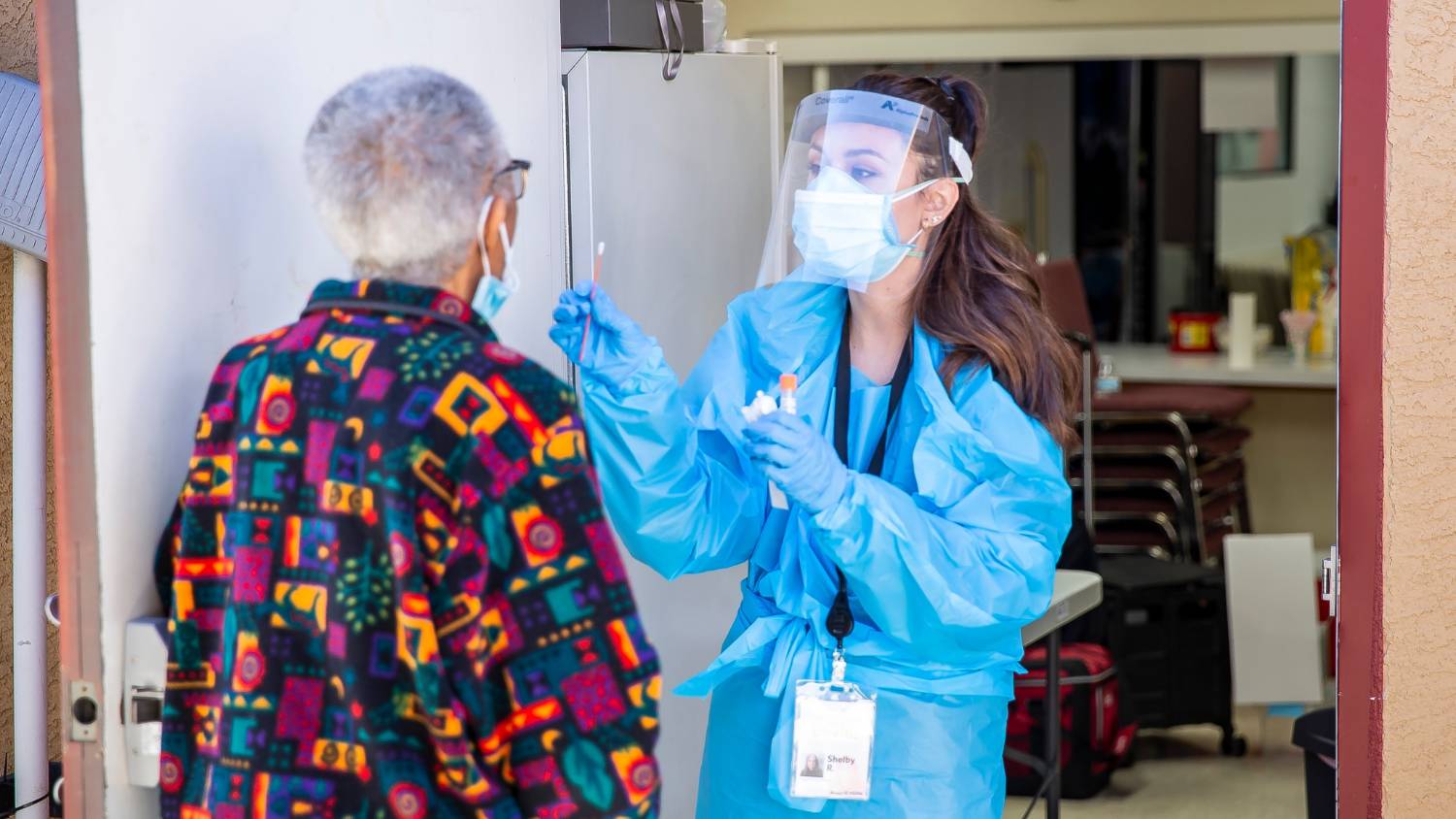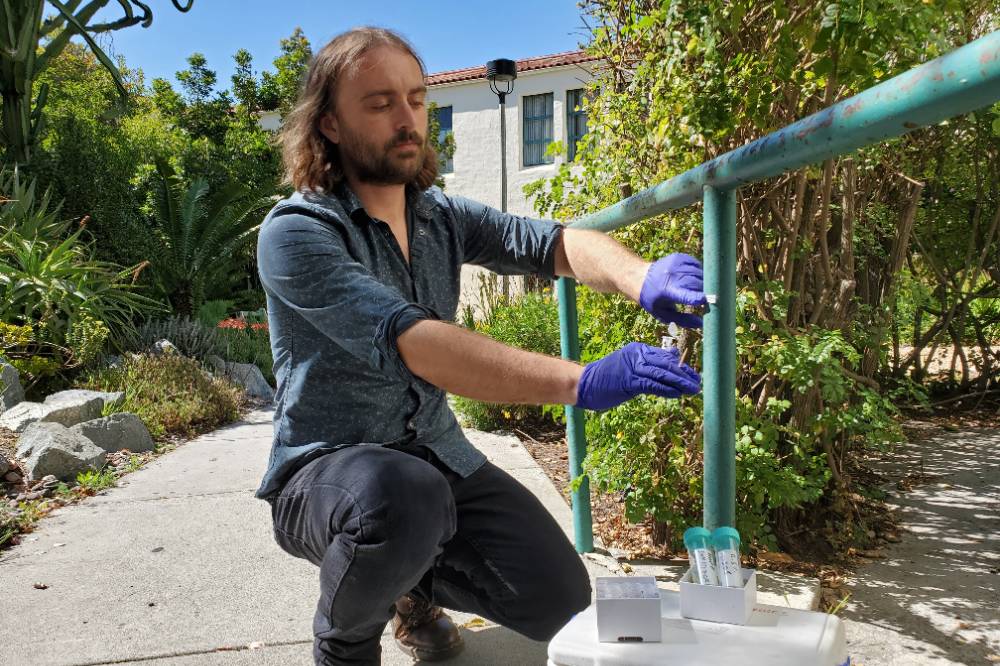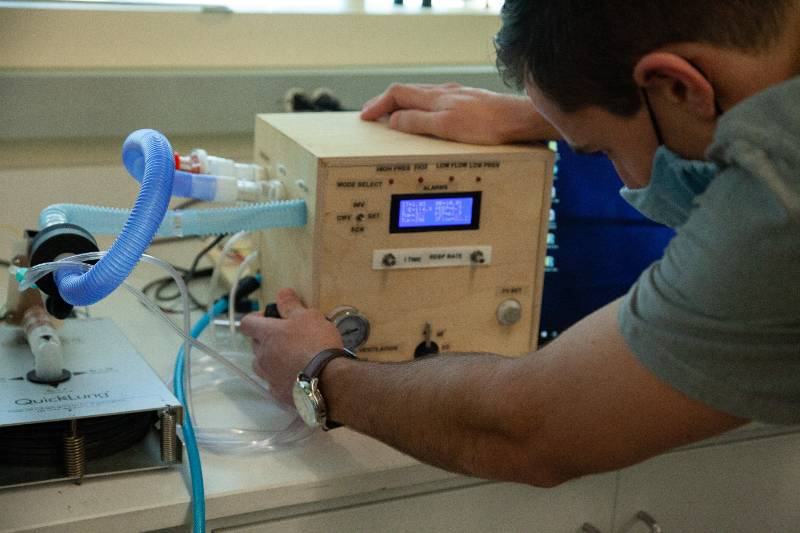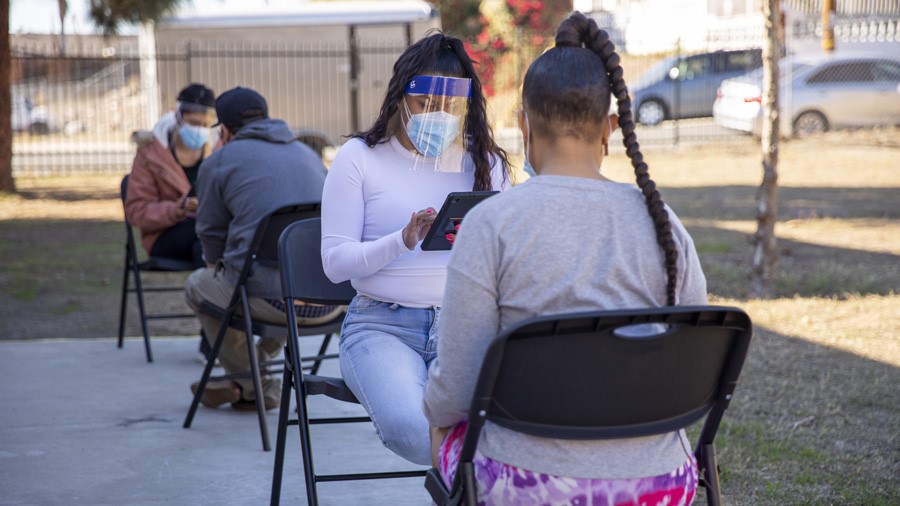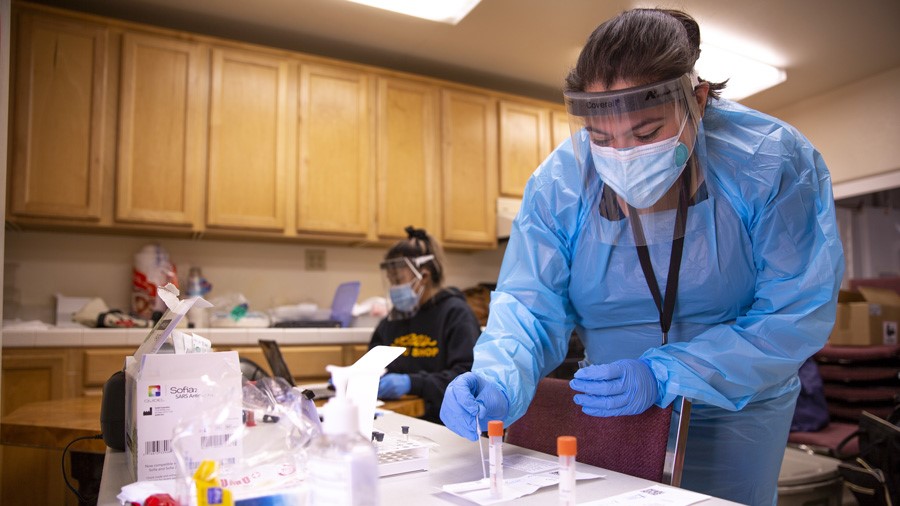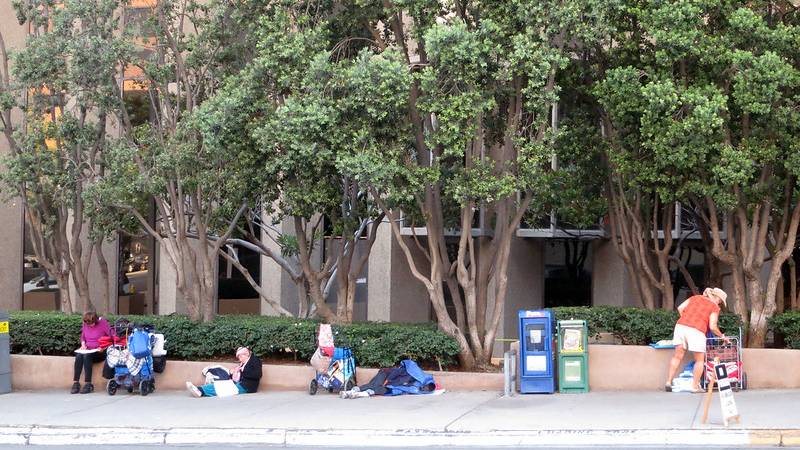College of Health and Human Services
Eric Post, a professor in the School of Exercise and Nutritional Sciences, is studying the
preparedness and challenges of athletic trainers at the NCAA Division I, II, and III
levels as colleges and universities resume sport participation during the COVID-19
pandemic.
Inside SDSU's Community COVID-19 Efforts
From contact tracing to testing and vaccine rollout, researchers pivoted quickly,
launching critical programs to help San Diego’s hardest hit groups.
"When COVID-19 began, our researchers pivoted quickly to help the community," said Hala Madanat, interim vice president for research and innovation and a health disparities researcher.
"We were able to do this mainly because of our longstanding relationship with local
communities and the county, which is built on many years of trust."
Community Efforts
School of Nursing professors Amanda Choflet and Judy Dye are collaborating with Sharp HealthCare to better understand the effect of COVID-19
on the stress, coping and anxiety levels of nurses. They conducted an anonymous survey
and analyzde the relationships between the pandemic and mental health outcomes in
nurses. By comparing outcomes across specialties, they will identify high-risk groups
and work with the health system to prepare community-level interventions. Preliminary
results found that a large portion of the surveyed nurses are at risk for clinically
significant levels of anxiety and depression, and have also experienced some type
of housing disruption. Choflet hopes the research can later be used to help inform
best practices.
Surabhi Bhutani, a professor in the School of Exercise and Nutritional Sciences, is examining the
relationship between loss of smell and taste and COVID-19. In partnership with colleagues,
she has developed an international questionnaire to assess perception in smell, taste
and chemesthesis before and during COVID-19. Preliminary findings indicate that in
4,039 participants diagnosed with COVID-19, smell, taste and chemesthesis was significantly
reduced.
In another analysis of 15,000 questionnaire participants, Bhutani and colleagues found
that smell loss during illness is the best predictor of COVID-19 status, This study
resulted in the development of a COVID-19 rating tool that may be used to screen for
recent smell loss.
Bhutani is also considering the effect of home confinement during COVID-19 on weight gain.
Researchers have found people ate more food and became more sedentary during quarantine.
Factors like boredom, cravings and high sleepiness led people to eat unhealthy and
be sedentary, while greater self-control, positive mood and low sleepiness led to
better health behaviors. The research team is collecting a second wave of data from
the same people to understand whether body weight and related health behaviors changed
during quarantine.
Public health researchers Hala Madanat, Susan Kiene, and Eyal Oren are leading a $5 million National Health Institute-funded project to increase uptake
of testing in underserved communities. In San Diego, Latinx residents are three times
more likely than white residents to become infected with the disease, and they account
for 61% of local hospitalizations, according to county figures. The research team
is working to curb these disparities and improve outcomes for underserved communities.
The effort, dubbed “Communities Fighting COVID!,” aims to test 42,000 people in 14
months.
Eyal Oren, a professor in the School of Public Health, is working with clinical partners in
San Diego to collect information on COVID-19 cases in order to understand who is more
likely to test positive for COVID-19 depending on characteristics like age, gender,
ethnicity or occupation. His $15,000 project is funded by San Diego County Health and Human Services.
Reducing disparities
As a part of a $5 million grant from the National Institutes of Health (NIH), public
health faculty will partner with community organizations to deploy rapid COVID-19
testing throughout the San Diego region. The effort, dubbed “Communities Fighting
COVID!,” aims to test 42,000 people in 14 months.
Reducing disparities
Lianne A. Urada, a professor in the School of Social Work, and a team of graduate students are conducting
a "COVID-19 Mental Health and Wellness Survey" that will examine how the pandemic
is affecting social workers, students and faculty self-care practices and ability
to teach. Findings may inform social work education, policy and practices.
JoAnn Silkes, a professor in the School of Speech, Language, and Hearing Sciences, is working
to establish a reliable way of administering language tests remotely to patients with
stroke-induced language disorders. The project was motivated by COVID-19 stay-at-home
orders and quarantine, when in-person assessments were replaced with video assessments.
School of Public Health faculty Guadalupe X. Ayala and Kristen J. Wells are leading a project to encourage participation in efforts aimed at minimizing and
preventing the spread of COVID-19 in vulnerable communities. They will create a multi-channel
communication campaign to promote COVID-19 testing, vaccine trial enrollment and vaccine
uptake and identify hard-to-reach patients in San Diego and Imperial Counties. Their $200,000 project is funded by the National Institute on Minority Health and Health
Disparities.
COVID-19 is a novel virus that demands effective nurse decision-making under unique
circumstances.
Nursing professor Christine Nibbelink
School of Nursing professors Christine W. Nibbelink and Willa Fields are exploring factors that influence acute care nurse decision-making when caring
for patients with COVID-19, such as patient deterioration assessments. The research
team is surveying acute care nurses virtually. Their qualitative research will explore previously unknown factors that guide nurse decision-making
during a pandemic.
Thirteen million people in the U.S. may have latent tuberculosis. For these individuals,
contracting COVID-19 could activate the bacterium and lead to a more severe form of
the disease. Faramarz Valafar, a professor in the School of Public Health, is conducting a multi-cohort study to
investigate the synergy between TB, COVID-19 and AIDS, and their rates of transmission.
The relationship between COVID-19 and TB
“We have already seen the synergy between TB and AIDS, so it’s a distinct possibility,”
said genomics expert and TB researcher Faramarz Valafar. “While having TB could make people more susceptible to COVID-19,
the coronavirus can also help spread TB much faster, acting as a vehicle of transmission.”
The relationship between COVID-19 and TB
School of Public Health researchers Richard M. Gersberg and Goran Bozinovic are studying COVID-19 shed into San Diego wastewater. Their $4,000 project is funded
by a local water district. Such testing has not occurred in San Diego, but in other
areas studies have demonstrated a correlation between concentrations of SARS-CoV-2
wastewater and COVID-19 clinical case reports. The researchers are analyzing historical
wastewater samples from the San Diego region and correlating results with clinical
case data provided by San Diego County Health and Human Services for evidence of past
and future SARS-CoV-2 circulation.
There has been limited research investigating adolescent mental health during the
COVID-19 pandemic or previous pandemics. Nursing professor Young-Shin Lee is studying how adolescents are experiencing the COVID-19 pandemic and its impact
on daily life, including anxiety, depression and academic performance. She is surveying
middle and high school students in Southern California.
SDSU’s School of Public Health is partnering with the County of San Diego Health and
Human Services Agency to advance the county’s COVID-19 contact tracing program in
underserved communities. The $3 million project, led by public health professors Hala Madanat and Corinne McDaniels-Davidson, allows SDSU faculty to train and recruit community health workers to support the
county’s disease control activities and to identify individuals believed to have come
into contact with those diagnosed with COVID-19.
Public health professor Susan Kiene is evaluating the effectiveness the contact tracing program; provide
feedback on implementation effectiveness and community-identified barriers; and help inform refinements to continued program implementation.
Containing the spread
"The importance of quickly and effectively identifying those at risk of contracting
the virus to inform them and ensure they follow specific guidelines cannot be underscored
enough. These efforts will undoubtedly help us to contain the potential spread of
COVID-19,” said SDSU President Adela de la Torre. “This partnership-based effort is
crucial for individual and community health as our city and state move forward with
plans to reactivate our economy."
Containing the spread
As COVID-19 causes health care practitioners to move appointments online, School of
Nursing professor Philip Greiner is working to improve the quality of telehealth access in Imperial County. In partnership
with primary care partner Clinicas de Salud del Pueblo, he is overseeing development of best practices for telehealth, training workers and funding necessary
equipment. His work is funded by the U.S. Department of Health and Human Services for $90,625 as a part of the CARES Act passed by congress in response to the pandemic.
SDSU has partnered with the San Diego County Health and Human Services Agency to train
more than 300 nursing students to administer the COVID-19 vaccine. SDSU School of
Nursing director Philip Greiner says many are already helping at vaccination sites across the county.
School of Public Health professors Kristen J. Wells and Susan Kiene are involved in a California-wide, academic-community partnership to identify community-engaged
approaches for addressing COVID-19 prevention, treatment, clinical trial enrollment
and vaccination in high-risk communities. The partnership compromises 11 academic
institutions and their community partners to implement and coordinate locally-informed
strategies statewide for education, research and policy. The alliance will share best
practices, findings and develop system-wide culturally-competent, linguistically-relevant,
and socially-considerate solutions in the form of policy changes, new infrastructure
and standardized processes. SDSU’s share of the project, titled “Share, Trust, Organize,
Partner: The COVID-19 California Alliance (STOP COVID-19 CA), is $320,000.
The SDSU site-specific project involves community health worker intervention for COVID-19
prevention and trial engagement, which will be implemented during the “teachable moment”
of COVID-19 test results return.
College of Sciences
Biology professor David Lipson is collaborating with San Diego biotechnology company Menon Biosensors and University
of California, San Diego researchers to develop a new COVID-19 test using a combination
of molecular biology and nuclear magnetic resonance technology. They aim to create
a high throughput testing system that circumvents the need for standard real-time
polymerase chain reaction (PCR) testing.
College of Sciences psychology professor Jean Twenge and Florida State University colleague Thomas E. Joiner compared levels of mental
distress experienced by U.S. adults during the pandemic to pre-pandemic distress levels.
Their study, published in the Journal of Clinical Psychology, found that during the pandemic adults were
eight times more likely to experience mental distress compared to adults in 2018. Twenge is also working on a study of mental health and time use among adolescents
during the COVID-19 pandemic.
Chemistry professor Erica Forsberg is studying blood serum samples from Sharp HealthCare. She will perform untargeted
metabolomics, looking for novel metabolites and biomarkers associated with COVID-19.
She wants to understand unique biological mechanisms in COVID-19 positive patients.
COVID-19 risk and severity
A large study of 50,000 people aims to explore COVID-19 risk factors and determine what causes disease severity and long-term impacts.
This will help scientists understand why some people become so gravely ill they need
to be hospitalized while others have a milder form of the disease.
Understanding risk
Chemistry professor Byron Purse and his lab are launching a new project that uses fluorescent probes to search for
inhibitors of SARS-CoV-2 replication. His lab is applying its expertise on fluorescent
modifications of DNA and RNA to create methods for studying the replicative processes
of coronaviruses. Other molecules that inhibit viral replication form the basis of
possible drug leads, and fluorescence-based methods are very valuable for identifying
these inhibitors quickly and efficiently.
Psychology researcher Keith Horvath is studying how substance use and HIV may impact COVID-19 infections. He is researching
how these factors interact with SARS-CoV-2 and how they impact pathogen levels by
dysregulating the gut-immune system. His work is funded by a $100,000 grant from the
National Institute on Drug Abuse. He is wokring with colleagues Adam Carrico (University
of Miami) and Sabina Hirshfield (SUNY, Downstate Health Sciences University).
Psychology professors Gregory Talavera and Linda Gallo are studying the impact of the COVID-19 pandemic upon the health and well-being of Latinx
residents of the South Bay region of San Diego. The research team is surveying some
2,200 participants on the psychosocial and socio-economic impact of the pandemic,
as well as COVID-19 health status, testing, hospital admissions and recovery.
The duo is also participating in a study of 50,000 people from diverse communities nationwide to explore COVID-19 risk factors,
predictors of disease severity, and its long-term impacts.This will help scientists
understand why some people become so gravely ill they need to be hospitalized while
others have a milder form of the disease.
Virology researchers Forest Rohwer and Naveen Vaidya are collecting and analyzing environmental samples for COVID-19. The research team
is developing mathematical and computational models to predict COVID-19 risk and trends
in different parts of San Diego. The project informs public agencies about how the
virus spreads and determines if there are environmental reservoirs where the virus
thrives. Their work is funded by a $200,000 Rapid Response Grant from the National
Science Foundation.
Understanding the virus
“In addition to improving our current knowledge of SARS-CoV-19, this research will
be important for the continuing response to CoVID-19 and future pandemics,” said viral
ecologist Forest Rohwer. “This study will help us understand the ecology of viral-human
interactions on surfaces, as well as train the next-generation of field virologists
and modelers.”
Understanding the virus
SARS-CoV-2, the virus that causes COVID-19, can remain viable in aerosols for more than three hours. Virologist John Mokili is conducting a surveillance of the virus in the air of certain classrooms, labs
and dormitories at SDSU, including rooms recently occupied by people who tested positive
for COVID-19.
College of Education
Charlene Holkenbrink-Monk, a doctoral student in the College of Education, is surveying students at a San Diego
charter K-12 school to collect and analyze their perceptions of how the school responded
to the pandemic. She aims to ensure students and teachers are supported through a
new and unprecedented teaching and learning experience.
Laura Owen, a school counseling adjunct faculty member, is addressing COVID-19 melt. Owen is an expert in summer melt, a term that refers to high school
seniors who are academically qualified, have been accepted to college and signaled
their intent to enroll, but who do not show up on any campus the semester after they
graduate high school. She is addressing the decline in fall 2020 federal student aid applications and renewals and college
enrollment rates, which are now being referred to as the COVID-melt. The project is
funded by a $27,358 grant from the District of Columbia College Access Program (DC-CAP)
and will expand its use of a two-way text messaging program designed to effectively
communicate with students, improve student engagement and outcomes and address the
barriers on student postsecondary pathways.
Owen has also designed a model to address the impact of COVID-19 on current school counselor
practice. As part of a $35,000 grant from Michigan College Access Network, Owens is
developing a fellows program to help school counselors in Michigan support college
and career readiness and postsecondary planning during COVID-19.
Postsecondary Educational Leadership professor Eric Felix leads an 18-month project exploring how COVID-19 affects racial equity efforts at
community colleges. Prior to the pandemic, student equity leaders (SELs) in California’s
community colleges developed three-year plans to address pressing outcome disparities.
Yet the pandemic has brought a lot of disruption to community colleges, which significantly
influences planned efforts to close equity gaps for racially minoritized students. Using
a critical organizational studies lens, Felix aims to study how four different SELs
navigate the pandemic, their unique organizational dynamics and the challenges of
remote work to sustain, adapt, and advance student equity efforts. The project will
inform policymakers, state-level actors and practitioners to navigate and advance
racial equity efforts in our current social context. The project is funded by a $120,000
grant from the College Futures Foundation.
College of Engineering
Several SDSU engineering professors and their students created low-cost assisted breathing
devices as a part of a U.S. Department of Defense Hack-a-Vent Challenge in March.
Mechanical engineer Kevin Wood and his lab created a prototype that can be assembled with readily available parts
to help hospitals in case of a surge in very ill patients needing ventilator assistance.
Creative, low-cost solutions
“We have researchers who are showing creativity and initiative in trying to help with
the pandemic, with low-cost options,” said former Vice President for Research Stephen
Welter. “This skill base is wonderful for the region and the nation to draw upon during
these testing times.”
Creative, low-cost solutions
Civil, construction & environmental engineering professors Natalie Mladenov and Matthew Verybyla, along with public health professor Kari Sant, are measuring SARS-CoV-2 in wastewater and evaluating its persistence in water.
The researchers use spiking and degradation experiments, combined with sample collection
from waterways with known wastewater contamination, to better understand the persistence
of SARS-CoV-2 in wastewater and surface water. The $16,700 project is funded by the California State University COAST program and San Diego River Conservancy.
Engineering professor Kee S. Moon and a diverse group of researchers are working on an SDSU Big Ideas project to create a lung digital health platform. COVID-19 has led to a permanent
shift toward virtual health care and other innovations that reduce human-to-human
contact, and Moon’s project will provide the ability to easily collect and understand
the lung health information of people and quickly and remotely connect health care
systems to health care providers, including overwhelmed hospitals. The benefits of
continuous health monitoring – even when a person shows no signs of illness – offers
a significant paradigm shift in future health care.
Moon has also helped to develop a wearable sensor the size of a Band-Aid, that can detect
early, remote detection of lung function abnormalities. The wearable device contains
medical-grades sensors, collecting more than 4,000 data points per second. Placed
on a person’s chest, it monitors heart and lung health, looking for problems in real-time.
The device can detect abnormalities in the lungs before a person shows COVID-19 symptoms,
alerting doctors before there’s a true emergency and hopefully preventing hospitalizations.
College of Arts and Letters
A team led by anthropologist EJ Sobo and public health researcher Noe Crespo is part of a national coalition working toward an equitable and effective COVID-19
vaccination rollout among historically underserved Black, Indigenous, and Latinx populations.
The CommuniVax initiative promotes COVID-19 vaccines among groups that have endured disproportionate health
and economic impacts from the pandemic. SDSU's team will focus on the South County region, conducting interviews with the
Latinx population for thoughts on how vaccine roll-out programs should be designed
and assisting communities with capacity building in support of future public health
resilience.
.
CommuniVax: Engaging San Diego’s Latinx Community in Equitable COVID-19 Vaccine Rollout
SDSU is part of a select national group that will synthesize community input for stakeholders
to develop effective vaccination efforts.
CommuniVax
The Center for Human Dynamics in the Mobile Age developed a comprehensive resource database to help monitor and visualize outbreak
patterns in San Diego County using big data, GIS and social media. The Research HUB offers six areas of collected data, including vulnerability maps, San Diego ZIP code
maps, timelines that track major policies and events for 16 major cities, and SMART
dashboards that use social media and keywords to monitor real-time information. The
“Vulnerability Map” visualizes and maps diabetes-related emergency department discharge
information by age and location in San Diego County.
Visualizing the virus
“These web apps can help San Diegans get a clear picture about the challenges and
problems we are facing now in our local communities. It will also reduce the spread
of incorrect information in San Diego regions," said Ming-Hsiang Tsou, director of SDSU's Center for Human Dynamics in the Mobile Age. "The Research HUB... could be instrumental
to national and international stakeholders for public health response planning."
Visualizing the virus
Geography professor and Center for Information Convergence and Strategy co-director André Skupin amassed and analyzed data to create a public resource on coronavirus diseases.. Before
COVID-19 resulted in a shutdown of much of the country, Skupin began sifting through
thousands of documents related to coronaviruses, going back more than fifty years.
He analyzed the data by focusing on bibliometric content from subject headings and
keywords, and compiled it to swiftly develop a publicly accessible knowledge map and dashboard. Since launching in March 2020, this unique resource has received industry accolades and global attention, with active users in 60 countries.
"It's really exciting to work on a project that matters." HDMA cartographer
Jessica Embury, a senior.
An interdisciplinary team of SDSU researchers affiliated with the Center for Human Dynamics in the Mobile Age is collaborating with an international group of collaborators led by Gabriela Fernandez to collect and track information about social behaviors, travel and public health
policies during the pandemic. SDSU researchers built the “Track IT COVID-19 Screening Tool@SDSU,” a large-scale survey seeking input from respondents from all over the world to
help track the spread of the disease and provide a clearer picture of how people across
the world experience the pandemic. The group wants to help educate public health organizations,
decision makers and the general public as these groups address policies related to
symptoms, social distancing, policy measures and social behaviors related to COVID-19.
Researchers from SDSU’s Youth Environment Society and Space (YESS) program created
a clickable resource map for children and families living in La Mesa and Spring Valley.
The map enables a spatial search for resources such as emergency childcare, shelters
and food banks; as well as more mundane but important resources such as public transit,
parks and schools. Geography professor Stuart Aitken and graduate students Jasmine Arpagian, Michelle Dubreuil and Empress Holiday developed
the resource based on UNICEF’s emergency response strategies under the Child Friendly
City initiative. (Map -- https://arcg.is/1vWb11)
Sociology professor Joseph Gibbons, public health researcher Eyal Oren and SUNY Albany professor Tse-Chuan Yang are investigating how factors like race
and social capital correlate with social distancing. They are using data collected
from Google Maps to determine how visits to work, stores and recreational sites have
changed since the start of the pandemic. The research team uses a spatial analytical
method called Geographically Weighted Regression to see how social capital — the sum
benefit of social connections — and racial and ethnic composition vary across locations,
and how that affects social distancing across the country.
So far researchers have found the benefits of social capital are highly stratified:
in some cases it is related to more distancing while in others it is related to less
distancing. In short, some communities are more unified in resisting COVID-19 than
others.
Bioethics of vaccination
Bioethicist Joe Stramondo on things to consider about prioritizing, underserved community
concerns and rationing decisions.
"
Since the pandemic began, essential workers have kept things going for the rest of
us. We need to think about what we owe them, for the risks they take on a daily basis,”
Stramondo said.
Who gets it when
Gibbons is also looking at how race and ethnicity correlates with the enforcement
of COVID-19 precautions by police in New York City. Gibbons, Yang and public affairs
professor Josh Channin analyzed non-emergency 311 police service calls to determine where enforcement is
more likely to take place and the outcome of the calls. Researchers found that there
are more likely to be social distancing violations in areas with higher shares of
white residents, but Black and Hispanic areas are more likely to have 311 calls that
result in arrests.
In a recent study, economist Shoshana Grossbard found U.S. states and European countries where the pandemic started later have experienced
fewer deaths from the virus than other countries. They also show that in part this
advantage of starting late may relate to learning from the success of various social
distancing measures, including lockdowns and school closures. Advantages may also
originate from medical advances in the treatment of COVID-19 since the virus first
spread. The study, "Later onset, fewer deaths from COVID," published in the medical
journal Pathogens and Global Health and was co-authored by University of Turin researcher
Ainoa Aparicio Fenoll.
Political science professor Cheryl O'Brien co-authored a paper in the journal ‘Politics & Gender,’ arguing that the COVID-19
pandemic exposes a multidimensional continuum of violence that comprises authoritarian,
exclusionary practices, and hierarchical relations that undermine democracy and the
everyday security of nondominant groups.
Economist Joseph Sabia co-authored a study that explored the impact of President Donald Trump’s 2020 presidential
campaign kickoff rally on physical distancing and COVID-19 related outcomes. Researchers
used anonymized smartphone data to track likely rally goers to their home counties,
and did not detect spikes in COVID-19 cases in areas that drew larger numbers of rally
attendees.
Investigating risks
“Our work emphasizes the importance of offsetting behavioral effects in understanding
the community health effects of large gatherings,” said SDSU researcher Joseph Sabia.
Investigating risks
College of Professional Studies & Fine Arts
Colter Ray, a professor in the School of Communication, is examining loneliness trends during the
COVID-19 pandemic and studying whether certain groups of people are more likely to
experience loneliness. Using a series of online questionnaires distributed during
the early months of the pandemic, this study inspects how people's experiences of
loneliness during the pandemic change over time. Early results show that people are
not reporting increases in loneliness over time; however, certain life situations
are more likely to be associated with increased feelings of loneliness during the
pandemic. For example, those who live alone and are not in a romantic relationship
report the highest levels of loneliness. Ray's research has also shown that as people
report greater levels of loneliness, the amount of compassion felt towards those affected
by COVID-19 decreases.
The country and world have been rife with misinformation during the pandemic.
Eyal Oren, public health researcher
School of Communication professor Lourdes Martinez and School of Public Health researcher Eyal Oren published a study in the American Journal of Public Health in October 2020 that analyzed tweets during San Diego's Hepatitis A outbreak in 2016 and 2017. Researchers say lessons learned from the outbreak about misinformation during a health crises can be applied to COVID-19 and possibly stem the current tide of misinformation and
reverse direction with proactive engagement on social media.
Barbara Mueller, a professor in the School of Journalism and Media Studies, is examining consumer
responses toward COVID-19 corporate social responsibility advertisements. Investigators
are comparing consumer responses from Germany and the U.S, across four different generations,
including Gen Z, Millennial, Gen X and Boomer.
Lourdes Martinez, a professor in the School of Communication, is studying information acquisition,
beliefs, attitudes, experiences of symptoms and behaviors of adults who disclose a
COVID-19 diagnosis on social media. Findings can help inform the design of future
COVID-19 interventions.
Shawn Flanigan and Megan Welsh, professors in the School of Public Affairs, are surveying unsheltered homeless to understand how people are coping and surviving during shelter-in-place orders,
which have disrupted access to needed services and resources.. Their project is funded by a $16,050 grant from the California Tobacco-Related Disease Research Program.
Impact on the unsheltered
“We’re very interested in shelter uptake and service uptake. With COVID-19, there’s
been a move to want people in shelters and bringing people in hotel rooms. We’re curious
how often people are being reached with those offers and how often they take up those
offers. Do they want to take advantage of them? Or are they being pressured to by
the police?” said public affairs researcher Shawn Flanigan.
Fowler College of Business
Vivian Huangfu, a professor of management information systems, is exploring factors that influence
the number of confirmed cases for COVID-19. She is collecting and analyzing data on
weather information, COVID-19 related tweets and case numbers.
Xialu Liu, a professor of management information systems, is using statistical methods to analyze
how government actions impact the spread of COVID 19.
Professors Martina Musteen and Ami Doshi are working on an SDSU Big Idea Initiative that addresses food insecurity -- a global
problem exacerbated by the COVID-19 pandemic. To encourage environmentally regenerative
and socially equitable food production, distribution and consumption, the researchers are
looking at alternative collaboration and business models that are inclusive and have
the capacity to bring about fundamental change. Faculty will study food ecosystems
and best practices across related industry domains, with the hope of brokering new
ideas and setting in motion a lasting, sustainability-based policy agenda to curb
food insecurity.

